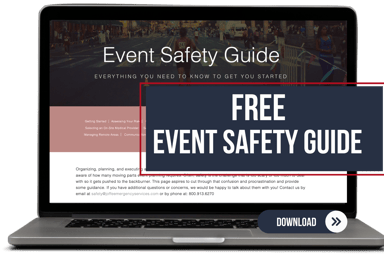2 min read
Are Your Teams Ready to Respond to Spring Weather? How to Get Started
![]() Elizabeth Rupert
:
Apr 10, 2024 11:02:00 AM
Elizabeth Rupert
:
Apr 10, 2024 11:02:00 AM
Spring weather brings a mix of challenges for event venues, from sudden rainstorms and high winds to the potential for more severe conditions like tornadoes and flooding. Ensuring your team is ready to respond to these variables is crucial for the safety of your guests and the integrity of your events.
At Joffe, we will always advocate for a proactive approach. Here are our best practices to help get you started:
Understand the Risks: Identify the specific spring weather risks your venue will most likely face. This could vary significantly depending on your geographic location. For instance, venues in the Midwest might prepare for tornadoes, while those in coastal or mountainous areas might focus on flooding. Understanding these risks is the first step in preparing your team to respond effectively. Analyzing weather incidents of the past, and inputting this information into a risk matrix format, is a great way to get a handle on what hazards should be at the top of your list.
.png?width=4510&height=2541&name=Joffe%20Map%20(4).png)
Develop a Comprehensive Plan: Once you know what you’re up against, develop a comprehensive emergency response plan. This plan should include:
- Evacuation routes and procedures: Clearly mark exits and safe areas, and ensure your team knows how to guide guests to safety.
- Communication strategies: Establish how you will communicate with your team and guests before, during, and after an emergency. Consider leveraging social media, your venue’s website, and email lists in addition to onsite announcements.
- Staff roles and responsibilities: Assign specific emergency response roles and review them frequently with team members.
Train Your Team: We say this a lot at Joffe, but training is perhaps the most crucial step in preparing your team for all emergencies. Include in your training schedule both general emergency response training and drills specific to the types of weather events your venue may encounter. If you can, collaborate with local emergency responders to practice working together and gather valuable insights.
Stay Informed: Keep abreast of weather conditions in your area, especially during peak spring months. Use weather tracking apps and sign up for local weather alerts so you can be proactive in your response. Keeping a close eye on the weather allows you to make informed decisions about canceling, postponing, or moving events indoors if necessary. If severe thunderstorms and tornadoes are on your radar, the National Weather Service’s Storm Prediction Center is a great resource for accurate, detailed forecasts up to eight days out.
Review and Improve: After any weather event, review your team’s response through a debrief. Gather feedback from staff and guests to identify what worked well and where you can make improvements. Continuously updating your emergency preparedness plan based on real-world experiences is vital for staying ahead of potential challenges.
 By understanding the risks, developing a comprehensive plan, training your team, and staying informed, you can increase your venue’s readiness to respond to the unpredictable nature of spring weather. For even more information and resources, check out our Free Event Safety Guide for everything you need to know to get started on making your event safer.
By understanding the risks, developing a comprehensive plan, training your team, and staying informed, you can increase your venue’s readiness to respond to the unpredictable nature of spring weather. For even more information and resources, check out our Free Event Safety Guide for everything you need to know to get started on making your event safer.

